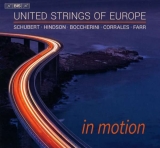 In Motion; Franz Schubert: Quartettsatz D. 703; Matthew Hindson: Maralinga für Violine & Streichorchester; Luigi Boccherini / Azkoul: Musica notturna delle strade di Madrid; Artur Corrales: Senores, les voy a contar...; Gareth Farr: Mondo Rondo; Amalia Hall, Violine, United Strings of Europe, Julian Azkoul, Franck Fontcouberte; 1 SACD BIS 2529; Aufnahme 03/2020, Veröffentlichung 11/2020 (50'44) - Rezension von Remy Franck
In Motion; Franz Schubert: Quartettsatz D. 703; Matthew Hindson: Maralinga für Violine & Streichorchester; Luigi Boccherini / Azkoul: Musica notturna delle strade di Madrid; Artur Corrales: Senores, les voy a contar...; Gareth Farr: Mondo Rondo; Amalia Hall, Violine, United Strings of Europe, Julian Azkoul, Franck Fontcouberte; 1 SACD BIS 2529; Aufnahme 03/2020, Veröffentlichung 11/2020 (50'44) - Rezension von Remy Franck
Das bereits 2012 von einer sehr internationalen Studentengruppe der Londoner Royal Academy of Music gegründete Ensemble United Strings of Europe steht unter der künstlerischen Leitung des anglo-libanesischen Geigers Julian Azkoul. Ihre erste Schallplatte bei BIS, In Motion, zeigt, dass das Ensemble nicht verlegen ist, sich mit einem effektvollen Programm zu präsentieren und dieses auch effektvoll zu spielen.
Schuberts Quartettsatz, für das Ensemble arrangiert von Azkoul selber, zeigt wie sich die etwa 12 Musiker mit großer Spielfreude und viel Engagement der Virtuosität hingeben.
Das zweite Werk ist zwar zeitgenössisch, aber keineswegs avantgardistisch oder verkopft, ganz im Gegenteil. Das Stück Maralinga des australischen Komponisten Matthew Hindson bezieht sich auf die geheimen britischen Atomtests in der südaustralischen Wüste, in Maralinga und Emu Creek, zwischen
1953 und 1963. Diese Tests umfassten Experimente mit Plutonium, die das Testgelände kontaminierten. Hindsons Stück für Violine und Streichorchester vermischt Geschichte, Atomtests und das Leben der Aborigines in einer teils sehr emotionalen, Leid evozierenden, aber auch aufbrausenden bez. explosiven Musik, die ebenfalls tänzerische Elemente sowie Naturlaute enthält. Das Stück ist entsprechend fantasievoll sowie in der kraft- und stimmungsvollen Interpretation von Amalia Hall und den United Strings of Europe auch unmittelbar ansprechend.
Boccherinis Quintett Musica notturna delle strade di Madrid hat Azoul freizügig bearbeitet, mit Elementen arabischer Musik angereichert und mit Anklängen an Blues und Country Music aktualisiert. Diese programmatische und ohnehin schon volkstümliche Komposition verträgt diese Verzierungen problemlos, da sie ebenso geschmackvoll wie musikalisch kohärent sind.
Das etwas nervöse Senores, les voy a contar… des 1979 geborenen Schweizer-salvadorianischen Komponisten Arturo Corrales bereitet den Weg für das virtuose und gelöste Quartett Mondo Rondo des 1968 geborenen neuseeländischen Komponisten Gareth Farr, das hier in einer Version für Streichorchester zu hören ist. In einer Anspielung an das Rondo ist es ein Werk, das in ständiger Bewegung ist und dem Titel des BIS-Produktion, In Motion, alle Ehre macht.
The ensemble United Strings of Europe, which was founded in 2012 by a group of students of the Royal Academy of Music in London, is under the artistic direction of the Anglo-Lebanese violinist Julian Azkoul. Their first release on BIS, In Motion, shows that the ensemble is not shy of presenting itself with an effective programme and to also play it effectively.
Schubert’s Quartettsatz, arranged for the ensemble by Azkoul himself, is performed with a lot of virtuosity and great enthusiastic commitment.
Although the second work is contemporary, it is by no means avant-garde or intellectual, quite the contrary. The piece Maralinga by Australian composer Matthew Hindson refers to the secret British nuclear tests in the South Australian desert, in Maralinga and Emu Creek, between 1953 and 1963, which included some very experimental plutonium that contaminated the test site. Hindson’s piece for violin and string orchestra mixes history, nuclear tests and the life of the Aborigines in a partly very emotional, sorrow evoking, but also quick-tempered or explosive music, which also contains elements of dance as well as sounds of nature. It is accordingly imaginative and in the powerful and atmospheric interpretation of Amalia Hall and the United Strings of Europe immediately appealing.
Boccherini’s quintet Musica notturna delle strade di Madrid has been freely adapted by Azoul, who enriched it with elements of Arabic music and with echoes of blues and country music. This programmatic and already folkloric composition easily tolerates these ornaments, as they are as tasteful as musically coherent.
The somewhat nervous Senores, les voy a contar… by the Swiss-Salvadorian composer Arturo Corrales (*1979, paves the way for the virtuoso and relaxed quartet Mondo Rondo by the New Zealand composer Gareth Farr (*1968), which can be heard here in a version for string orchestra. In an allusion to the rondo, it is a work in constant motion and perfectly refers to the title of the BIS production, In Motion.
























